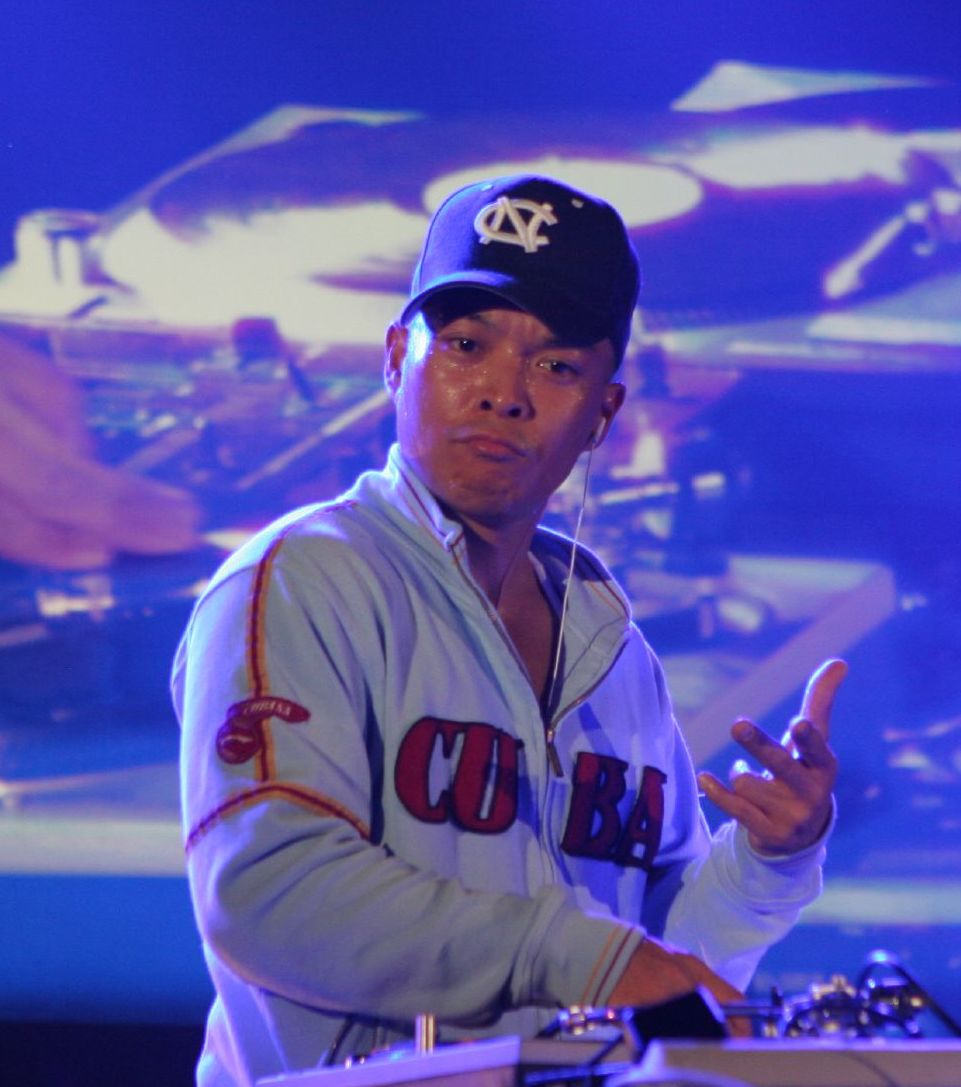
Turntablism
Turntablism is the art of manipulating sounds and creating new music, sound effects, mixes and other creative sounds and beats, typically by using two or more turntables and a cross fader-equipped DJ mixer.[1] The mixer is plugged into a PA system (for live events) and/or broadcasting equipment (if the DJ is performing on radio, TV or Internet radio) so that a wider audience can hear the turntablist's music. Turntablists typically manipulate records on a turntable by moving the record with their hand to cue the stylus to exact points on a record, and by touching or moving the platter or record to stop, slow down, speed up or, spin the record backwards, or moving the turntable platter back and forth (the popular rhythmic "scratching" effect which is a key part of hip hop music),[2] all while using a DJ mixer's crossfader control and the mixer's gain and equalization controls to adjust the sound and level of each turntable. Turntablists typically use two or more turntables and headphones to cue up desired start points on different records (Greasley & Prior, 2013).
Turntablists, who are often called DJs (or "deejays"), generally prefer direct-drive turntables over belt-driven or other types, because the belt can be stretched or damaged by "scratching" and other turntable manipulation such as slowing down a record, whereas a direct drive turntable can be stopped, slowed down, or spun backwards without damaging the electric motor. The word turntablist is claimed to be originated by Luis "DJ Disk" Quintanilla (Primus, Herbie Hancock, Invisibl Skratch Piklz).[3] After a phone conversation with Disk, it was later popularised in 1995 by DJ Babu[4] to describe the difference between a DJ who simply plays and mixes records and one who performs by physically manipulating the records, stylus, turntables, turntable speed controls and mixer to produce new sounds. The new term coincided with the resurgence of hip-hop DJing in the 1990s.
According to most DJ historians, it has been documented that "DJ Babu" of the "Beat Junkies" / "Dilated Peoples" was the one who originally coined the term "turntablist". In 1995 while working on the groundbreaking mixtape "Comprehension", DJ Babu hand wrote the name "Babu The Turntablist" on hundreds of copies of this mixtape to describe his style of DJing, while working on the track "Turntablism" with "D-Styles" and DJ Melo-D, Babu would say "if someone plays the piano, we call them a pianist, if someone plays the guitar, we call them a guitarist, why don't we call ourselves Turntablists?" found in the documentary "Scratch (2001 film)" which was released in 2001.
John Oswald described the art: "A phonograph in the hands of a 'hiphop/scratch' artist who plays a record like an electronic washboard with a phonographic needle as a plectrum, produces sounds which are unique and not reproduced—the record player becomes a musical instrument."[5] Some turntablists use turntable techniques like beat mixing/matching, scratching, and beat juggling. Some turntablists seek to have themselves recognized as traditional musicians capable of interacting and improvising with other performers. Depending on the records and tracks selected by the DJ and their turntablist style (e.g., hip hop music), a turntablist can create rhythmic accompaniment, percussion breaks, basslines or beat loops, atmospheric "pads", "stabs" of sudden chords or interwoven melodic lines.
The underground movement of turntablism has also emerged to focus on the skills of the DJ. In the 2010s, there are turntablism competitions, where turntablists demonstrate advanced beat juggling and scratching skills.
Contests[edit]
Like many other musical instrumentalists, turntablists compete to see who can develop the fastest, most innovative and most creative approaches to their instrument. The selection of a champion comes from the culmination of battles between turntablists. Battling involves each turntablist performing a routine (A combination of various technical scratches, beat juggles, and other elements, including body tricks) within a limited time period, after which the routine is judged by a panel of experts. The winner is selected based upon score. These organized competitions evolved from actual old school "battles" where DJs challenged each other at parties, and the "judge" was usually the audience, who would indicate their collective will by cheering louder for the DJ they thought performed better. The DMC World DJ Championships has been hosted since 1985. There are separate competitions for solo DJs and DJ teams, the title of World Champion being bestowed on the winners of each. They also maintain a turntablism hall of fame.[21]







